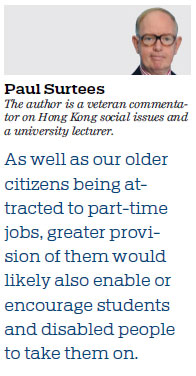Time HK adopts flexitime to attract more workers
Updated: 2019-01-11 06:09
(HK Edition)
|
|||||||||
Paul Surtees believes adopting greater flexibility in working hours would increase productivity, tax revenue and help companies, employees
Many Hong Kong businesses are renowned for their reliability and efficiency, but those levels of efficiency are only achieved by their hard-working employees. Regrettably, the idea of having a healthy work-life balance remains but a distant dream for far too many of them. Having a full-time job in Hong Kong often means having the equivalent of having a job and a half!
While the use of ever-faster information technologies can certainly enhance efficiency, the other side of this coin is that many employees remain all-too-contactable about their work, 24/7, weekends and holidays included, via their smartphones. They never get a break from being in touch, which must eventually result in burn-out, because of the continual stresses involved. Such intended "down time" from work really should be sacrosanct, and the off-duty employee left in peace, save for the most dire emergencies.

During busy periods at work, many staff members need to start early and stay late, and not all such involuntary overtime is adequately compensated by their receiving overtime pay, or time off in lieu during less frantic periods.
On the other hand, having fixed hours of work, such as 9 am to 6 pm in an office, represents a level of inflexibility about their availability that surely puts off many people, especially the parents of young children, or the family carers of elderly relatives, from seeking or holding a full-time job. It may be that many people handling such important outside responsibilities would be readily prepared to join or to rejoin the full-time workforce only if they were allowed much greater flexibility in their hours of work.
Several decades ago, I worked as a civil servant in London, at a time when flexible working hours were being introduced to the workforce, and we all greatly liked and appreciated the change. Hong Kong is well behind this particular curve, with few big employers here yet offering enough flexibility in working hours to their staffs.
The flexitime system allows employers to set out "core time", such as 10 am to 12 noon and 2 to 4 pm, during which all employees are required to be at work. That facilitates having staff meeting and training times, being open to visitors/customers and so on. The employer can also specify the options for more self-chosen working hours, meaning for example that an employee can start work at any time from 8 to 10 am; can take a lunch break of 30 minutes to two hours; and leave any time from 4 to 6 pm. The individual can vary his working hours from day to day, within these constraints. Many companies find that introducing flexible working hours helps generate more productivity from their employees, who will often choose to work late to complete an urgent job, knowing that they can leave early on other days, in compensation.
The employer can specify a monthly total of hours that need to be worked, leaving the choice of when to build up those hours up to individual staffers, so far as practicable. Monthly credits or debits can be set to a maximum. Those with high credits can use up their "excess hours" by taking a day or half day off work each month. Employees, such as those conducting the school run, needing to go to the dentist, and so on will appreciate this high level of flexibility about when they need to be at work. Long commutes often make it difficult to calculate accurately work arrival times, but under flexitime that is no longer a problem.
Of course, some level of cooperation will often be needed, to help to coordinate team work. For example, while I used to arrive at my civil service office at 10 am, my secretary usually turned up sharp at 8 am, and went home much earlier too. That was not a problem, but if it had been, we both might have compromised by starting together at 9 am.
Many older people would relish the chance to work part-time; making more part-time jobs available would encourage them to remain longer in the workforce; something that might well not be so attractive to them if only full-time jobs are offered. For example, offering such part-time working hours as 10 am to 3 pm could encourage the mothers of young children to remain in the workforce, when they would not be able to undertake full-time work because of family needs.
As well as our older citizens being attracted to part-time jobs, greater provision of them would likely also enable or encourage students and disabled people to take them on.
And then, job-sharing schemes, while well-established elsewhere, have yet to become established here in Hong Kong. Having staggered working hours would do much to reduce the present crush and off-putting discomfort of rush hour commuting. So, all-in-all, having much greater flexibility of working hours could result in beneficial effects for companies, as well as for employees, not to mention increasing our city's total productivity and tax revenue and less welfare payments in some cases.
(HK Edition 01/11/2019 page12)